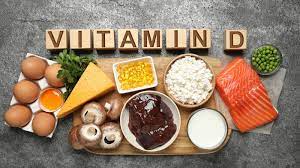
‘Game Changer’ Insights: Vitamin D’s Profound Impact on Digestive Tract Cancers
New analysis indicates that Vitamin D supplementation has a significant impact on reducing the risk of relapse or mortality in a specific subset of patients with digestive tract cancers exhibiting p53-immunoreactivity.
Within this subgroup, daily intake of Vitamin D was linked to a remarkable 73% decrease in the risk of relapse or mortality. Notably, the 5-year relapse-free survival (RFS) rate stood at 81% for those receiving Vitamin D, in stark contrast to the 31% RFS rate observed in the placebo group.
However, it’s worth noting that Vitamin D supplementation didn’t influence survival outcomes in the non-p53-immunoreactive subgroup.
These findings have garnered significant attention in the realm of Vitamin D and cancer research. Dr. Michael Holick, affiliated with the Boston University Chobanian & Avedisian School of Medicine, described these results as a paradigm shift for the field. The AMATERASU trial, which forms the basis of this study, contributes a novel dimension to our comprehension of whether enhancing Vitamin D levels holds potential benefits for reducing cancer risk and improving relapse-free and mortality outcomes.
Growing scientific evidence hints at Vitamin D’s potential in lowering cancer-related mortality; however, its effectiveness appears to be contingent on a patient’s tumor biology, particularly the p53 protein, as elucidated by the authors of this analysis.
In a 2019 randomized controlled trial conducted by the same research team, daily Vitamin D supplements of 2000 IU didn’t yield improvements in 5-year RFS among patients with digestive tract cancers. Yet, a subsequent post hoc analysis of the AMATERASU trial in 2020 indicated that Vitamin D supplementation led to enhanced RFS in a specific subset of patients exhibiting p53-positive digestive tract cancers, as confirmed through immunohistochemistry (IHC) staining (79% vs. 57% in the placebo group; hazard ratio [HR], 0.52; P = .02).
In this current post hoc analysis of the AMATERASU trial, researchers delved into whether Vitamin D supplementation holds the potential to lower the risk of relapse or mortality within the subgroup of patients manifesting p53 immunoreactivity. This immunoreactivity was defined by both nuclear p53 protein accumulation in over 99% of cancer cells (as observed through IHC staining) and the presence of anti-p53 antibodies in serum.
The trial enrolled patients with stage I-III luminal gastrointestinal cancer who had undergone complete tumor resection. These patients were randomly assigned to receive either a placebo or oral Vitamin D supplements at a daily dosage of 2000 IU from their initial postoperative visit through the trial’s conclusion, which spanned up to 8 years.
The post hoc analysis, categorized by p53-immunoreactive status, encompassed 392 patients, with colorectal cancer accounting for 47%, gastric cancer for 43%, esophageal cancer for 9%, and small bowel cancer for 0.5%.
Within the p53-immunoreactive subgroup of 80 patients, the analysis unveiled that Vitamin D recipients experienced relapse or mortality in nine out of 54 cases (17%), whereas the placebo group exhibited these outcomes in 14 out of 26 cases (54%). The 5-year RFS proved substantially higher in the Vitamin D group, standing at 81% compared to 31% in the placebo group (HR, 0.27; P = .002).
This contrasted with the non-p53-immunoreactive subgroup comprising 272 patients, where Vitamin D supplementation didn’t exhibit any noticeable influence on the 5-year RFS compared to the placebo (22% vs. 21%; HR, 1.09; 95% CI, 0.65-1.84).
The central takeaway from this study underscores the substantial reduction in relapse or mortality risk with a daily Vitamin D dose of 2000 IU among the p53-immunoreactive subgroup. This finding also prompts the exploration of cancer immunotherapy strategies targeting mutated p53 proteins, according to Mitsuyoshi Urashima, MD, PhD, MPH, and colleagues from Jikei University School of Medicine in Tokyo, Japan.
The study received support from the Japan-Supported Program for the Strategic Research Foundation at Private Universities and a grant from the Japan Society for the Promotion of Science of the Ministry of Education, Culture, Sports, Science, and Technology. The authors disclosed no pertinent financial relationships. Dr. Holick reported grants from Carbogen Amcis and Solius; personal fees from Biogena, Sanofi, Faes Farma, Eric Anthony Nepute, and others; nonfinancial support from Ontometrics outside the submitted work; and held a patent for Novel Use of 25 hydroxy vitamin D pending for Carbogen Amcis BV and Aamanya AG.











